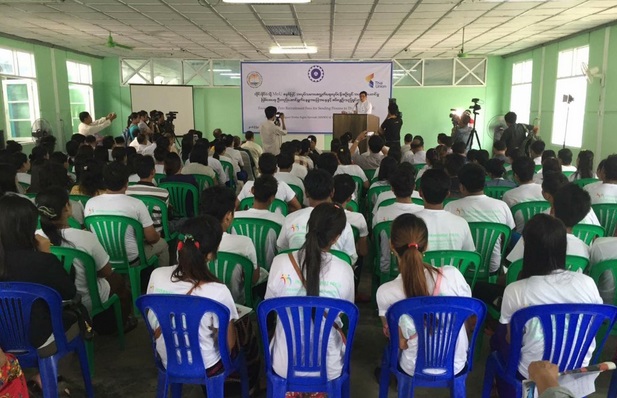Some 200 Burmese nationals seeking employment in neighbouring Thailand signed job contracts at a press conference held in Rangoon over the weekend to publicise a new “ethical recruitment” scheme.
The “Zero Fee Thailand MoU Migrant Worker Recruitment Pilot Project”, launched in March by major seafood exporter Thai Union Group in partnership with the Bangkok-based Migrant Workers Rights Network (MWRN), aims to bypass the often extortionate fees often charged by employment agencies.
Under the new scheme, workers will only be required to pay for visa application fees, medical checkups and work permit fees totaling around US$150. Previously, workers would have had to pay up to $1,000 in fees to agents and brokers.
So far, the project has been a big success, according to Andy Hall, MWRN’s international representative.
“Over 1,000 migrant workers have gone through the process since March,” said Hall, speaking to DVB after the press conference on Saturday.
According to Hall, the official Thai system for employing foreign workers, based on a Memorandum of Understanding (MoU) signed by the governments of Thailand, Burma, Cambodia and Laos in 2002, is “a mess” that often invites exploitation of workers by unscrupulous middlemen.
“In too many cases, the MoU process becomes legal trafficking, or a form of trafficking, because of the debt bondage, the cost and the way in which the whole process is implemented,” he said.
Despite the success of the pilot project, however, other major Thai companies have been slow to get on board.
“This is our attempt at showing people how it should be done, how the employer has to respond to the abuses occurring, they have to prevent workers from going into debt bondage,” said Hall.
HR Director of Thai Union Group, Vorarat Lertanantrakool who spoke at the event, said the zero recruitment fees policy is a major step towards eliminating potential abuses of labour: “This means the fees for recruitment services are covered by Thai Union and recruited workers are supported on recruitment services cost including pre-departure training, accommodation and meals during assigned training dates, and domestic transportation to Thai Union.”
[related]
Hall said that overall, he is pleased with the progress of the pilot programme and with the level of cooperation it has received from the governments of Burma and Thailand: “MWRN are happy both the Myanmar and Thai governments support our pilot programme and hope other Thai companies and recruitment agencies will learn from this to adopt ethical recruitment processes.”
In a related development, the Thai Broiler Processing Exporters Association and two Thai government departments introduced new guidelines governing labour practices in the Thai poultry industry.
“The code of conduct is good as it lays down a code of best practice, but is not enforceable,” said Hall. “It is still at an early stage.”



